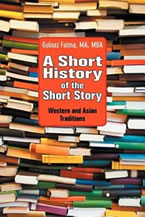Article first published as Book Review: A Short History of the Short Story in the Western and Asian Traditions by Gulnaz Fatma MA, MBA on Blogcritics.
October 22, 2012
A Short History of the Short Story in the Western and Asian Traditions
Gulnaz Fatma MA, MBA
Modern History Press (2012)
ISBN: 9781615991662
New Book Reveals Fascinating History of the Short Story in the East and West
 “A Short History of the Short Story in the Western and Asian Traditions” delivers exactly what its title promises, but despite its short length, the information packed into these approximately 10,000 words is equivalent to taking a graduate level course on the topic.
“A Short History of the Short Story in the Western and Asian Traditions” delivers exactly what its title promises, but despite its short length, the information packed into these approximately 10,000 words is equivalent to taking a graduate level course on the topic.
Anyone interested in the short story as a student or scholar of literature, or a would-be practitioner of this literary art, will find Professor Fatma’s monograph on the subject to be thorough, enlightening, and stimulating.
The expected discussion is included about the short story’s development in America at the hands of Washington Irving, Edgar Allan Poe, and Nathaniel Hawthorne, and readers might not even be surprised by the mention of some well-known French, British, and Russian practitioners of the genre, but the details provided about many of these authors’ works is commendable. And while Professor Fatma only has space to mention briefly various writers, she manages frequently to point out what was special about individual authors and how an author’s time period, country, and culture influenced the short stories he or she crafted.
While much of the history of Western short stories is common knowledge, Fatma delves into ancient examples that inspired the short story format, including Homer’s “Odyssey,” Egyptian manuscripts, numerous fables, and the great influence of “The Arabian Nights,” beginning in the eighteenth century when it was first published in Europe. Also explored is the relationship between the novel and the short story and why and how the short story gained popularity in America during its infancy, while being less favored in Britain.
Ultimately, the greatest value of this book is the in-depth chapter on the short story in India. Professor Fatma discusses how the British rule of India led to the development of Indian literature written in English, and how the Indian short story has developed as a distinctly Indian form. Fatma makes mention of how many Indian short story writers—R.K. Narayan and Ruskin Bond—have become internationally famous, and yet their works have received little critical attention. Her book, hopefully, will serve to turn that tide; I know it has made me eager to explore the short fiction of India.
As both a former literature professor who used to teach the history of the short story, and as a fiction writer, I found “A Short History of the Short Story” to be informative, fascinating, and a true addition to my understanding of world literature and the short story genre in particular. I highly recommend it to all students of literature.
For more information about Gulnaz Fatma and “A Short History of the Short Story in the Western and Asian Traditions,” visit www.ModernHistoryPress.com.
— Tyler R. Tichelaar, Ph.D. and award-winning author of “Spirit of the North: a paranormal romance”

